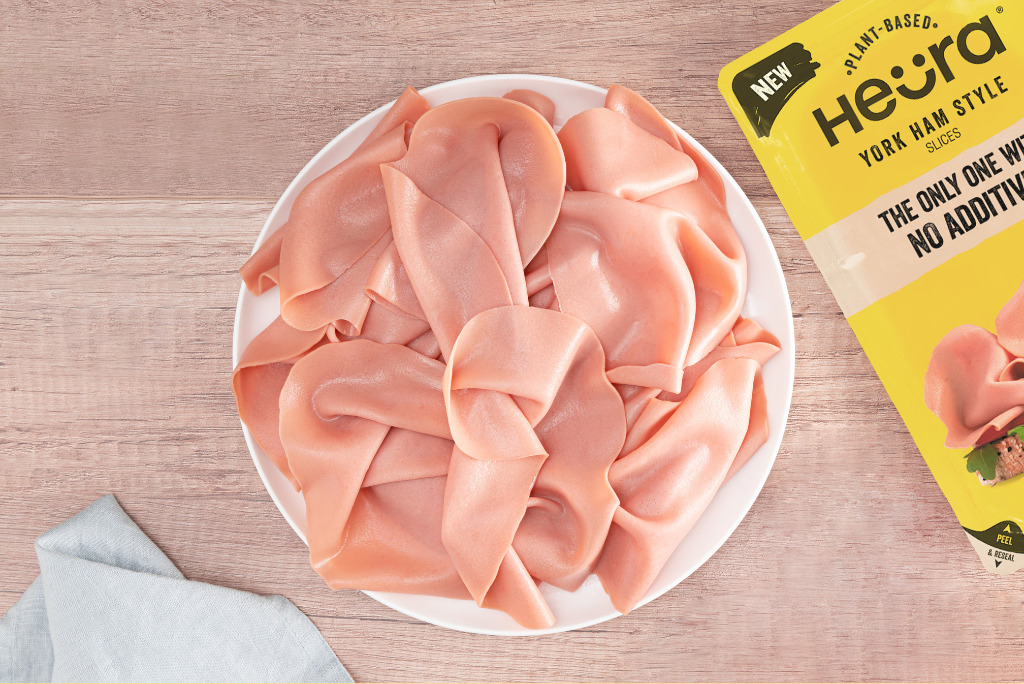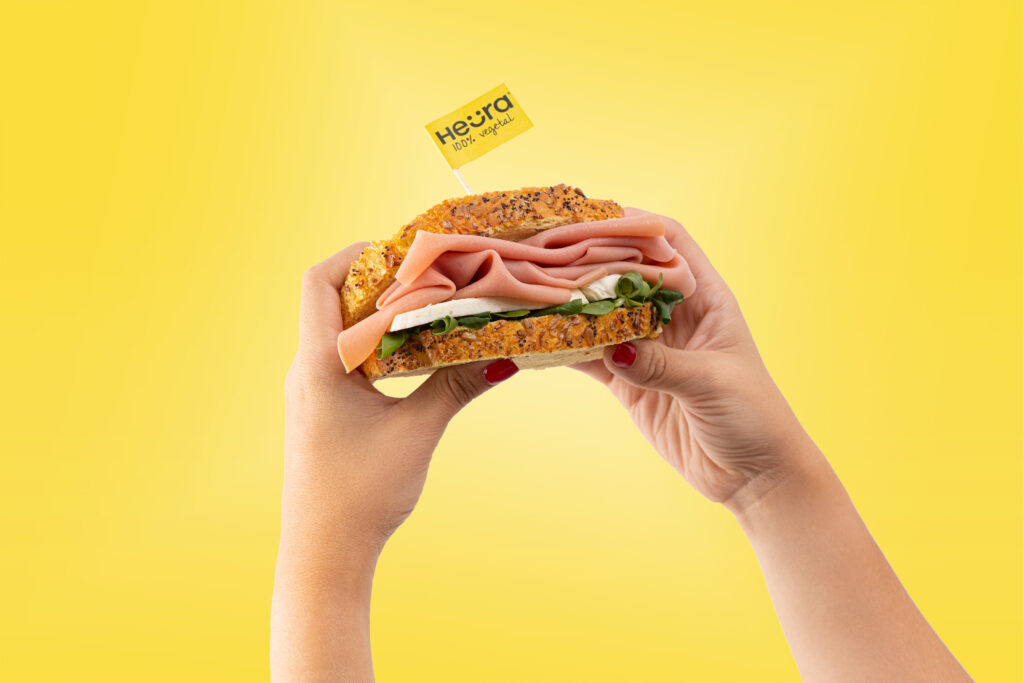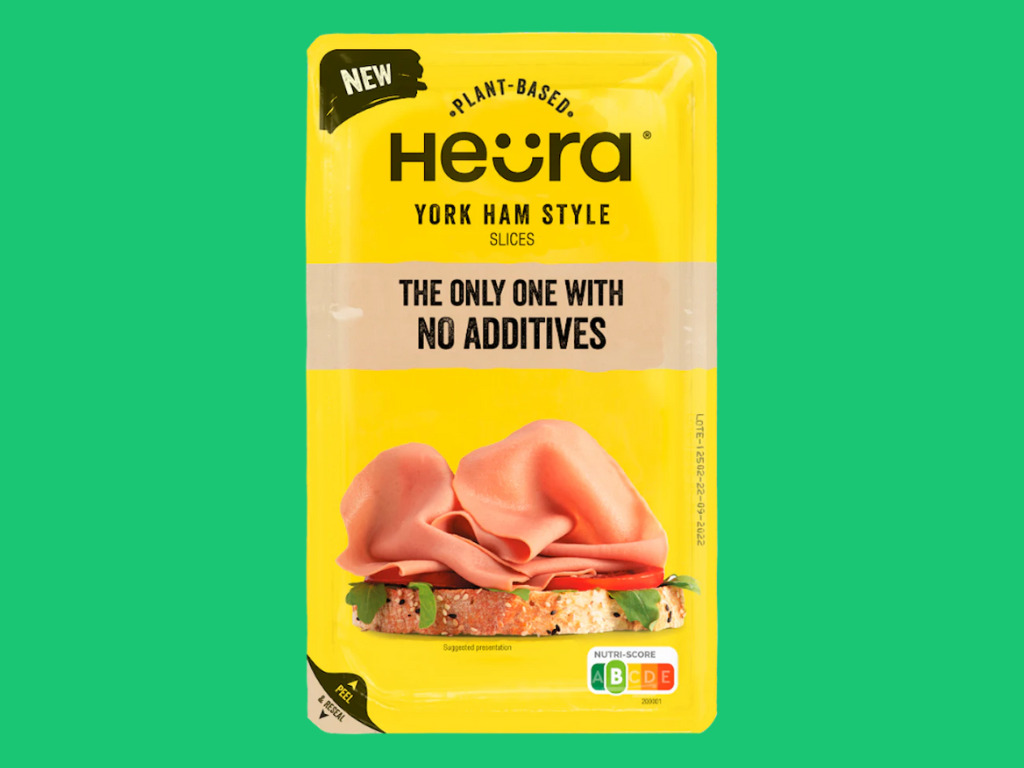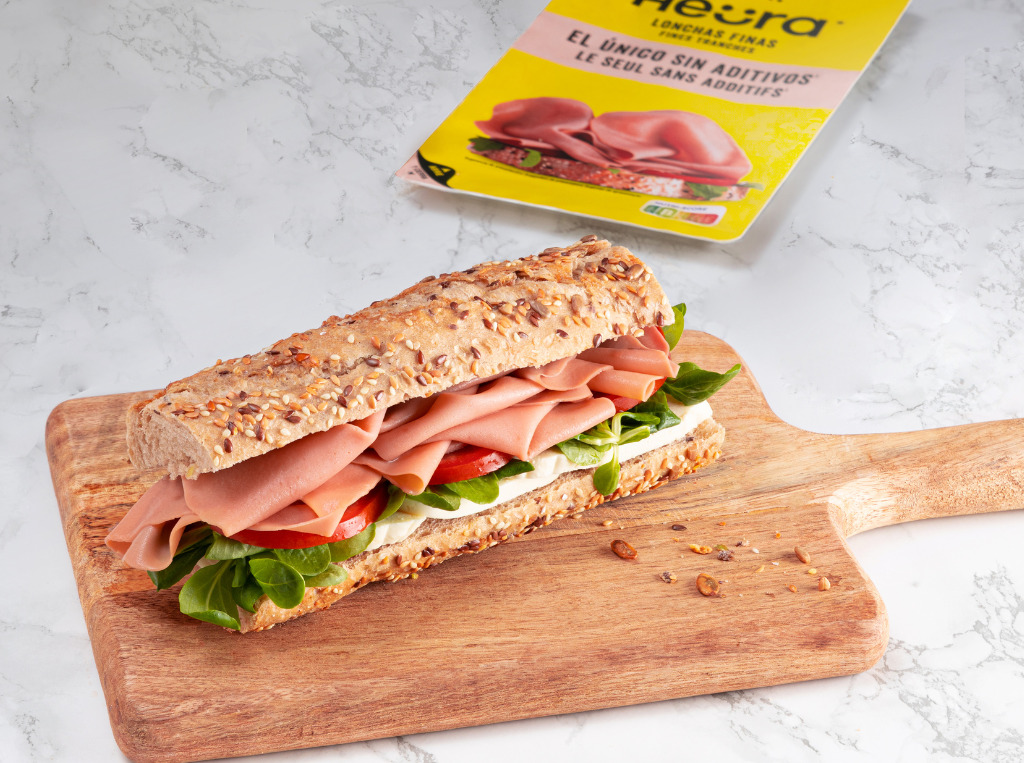6 Mins Read
Spanish plant-based meat company Heura has added vegan York-style deli ham slices to its range of clean-label alternatives to conventional meat. The new 11-ingredient ham is made using the brand’s patent-pending tech and will be available in Spain and France, albeit at a slight price premium compared to conventional ham.
Heura’s York-style ham boasts 64% protein density (and 18g of protein per 100g), with 0.9g of saturated and 3.7g of total fat per 100g. This is partly thanks to the use of extra-virgin olive oil (which makes up 3.1% of the product) – in addition to that, it’s comprised of water, soy protein isolate (21%), natural flavourings, salt, radish, carrot, paprika and lemon concentrates, cultures and vitamin B12.
The ‘additive-free’ aspect is a key selling point for Heura, both on health and consumer adoption grounds. In 2020, a global survey by Ingredion revealed that more than half of respondents find it important for products to have a short ingredient list. Following up on this, Ingredion’s latest data found that 78% would spend more money on products with ‘natural’ or ‘all-natural’ packaging claims.
It’s also something that has been the bane of plant-based meat, at least according to Big Meat. One of the meat lobby’s main arguments against these alternatives is the somewhat longer, ‘processed’ ingredient lists. In the US, for example, one group connected to the animal agriculture industry has run years of ads targeting companies like Beyond Meat and Impossible Foods.
And as for the health aspect, this is increasingly becoming the major reason for consumers to adopt plant-based foods. According to a 2022 survey of 3,7000 respondents in seven countries, having a healthier diet is the primary motivator for 75% of consumers to begin consuming alternative proteins.
Additive-free alternative to ultra-processed meat

Calling plant-based alternatives to red meat – especially ham – ultra-processed is counterintuitive, given that ham itself is a processed meat, and that it has been classed as a carcinogen by the WHO, in the same vein as pollutants like tobacco smoke and plutonium. Moreover, studies have found that eating 50g of processed meat daily increases the risk of colorectal cancer and coronary heart disease by 18% each.
“The Heura slices are not an alternative to those of animal origin; they are their successors,” says Heura co-founder and CEO Marc Coloma. “Our priority has always been to offer our consumers the experience of consuming animal-origin meat, in terms of taste and texture, while improving nutritional values, using high-quality ingredients, and, at the same time, protecting our planet. Good nutrition equals good health.”
He adds: “In the context of a health crisis, institutions and industry must play a fundamental role in leading the transition towards a healthier and more sustainable food system. Health should always come before other types of interests.”
Heura’s York-style vegan ham is positioned as a more nutritionally complete product than conventional deli meat. It carries a B rating on the Nutri-Score scale, which marks it the first time one of the company’s products hasn’t received the top score of A. However, as Coloma points out, this rating still outperforms traditional cold cuts, which often receive C or D Nutri-Scores due to salt levels and multiple additives.
“When designing the products we put the focus on providing a highly nutritious protein with a mouthwatering experience,” Coloma tells Green Queen. “Our specific aim with this product is to enhance its nutritional profile by increasing the fibre content while maintaining the exceptional taste. We are dedicated to the goal of elevating its Nutri-Score from a B to an A, all while preserving the delightful flavour that sets it apart. Here, consumer feedback will be key to our continuous improvement.”
Patent-pending technology

The plant-based ham slices are created using Heura’s patent-pending tech-led by its Good Rebel Tech division, which was unveiled in April. Using a novel thermomechanical processing technique, it can create vegan products with superior sensory and nutritional values with shorter ingredient lists. The tech only requires protein, water and oil to structure the product and incorporate texture and sensorial properties without additives.
While this isn’t exactly AI, Heura’s tech relies upon using mathematical models in a similar way. “The main difference is that we are basing our approach and models on new scientific understanding of plant proteins that we generate in the tech lab,” explains Coloma. “We can improve [the] accuracy of our predictions, limit biases and, most importantly, develop breakthrough technological solutions which are based on new scientific knowledge; rather than optimising technologies that already exist based on published existing data.”
“We use a transdisciplinary approach to scientific research to overcome the greatest challenges the industry is facing,” adds Heura CTO Isabel Fernandez. “Our goals are ambitious. We are not aiming for small, incremental advancements based on cumulative improvements on what already exists, but rather exponential progress from scientific discoveries yielding breakthrough technological innovations.”
Reaching price parity and future innovations

Given the advanced tech and cleaner labels, it perhaps doesn’t come as a surprise that the plant-based ham slices have a slight price premium compared to animal-derived ham. In its home market of Spain, where it will enter supermarket charcuterie sections this week, the price for a 78g pack with four slices is €2.99, compared to about €2 for 200g of conventional ham.
Reaching price parity is key to Heura, which secured €20M in pre-Series B funding last year and raised over €2.6M in crowdfunding earlier this year (taking total investment to more than €48M/$50.9M). “We have a plan to reach price parity by further innovations on our developed technology, as well as new technological solutions to accelerate this goal, which are currently within our S&T project pipeline,” says Coloma. “Democratising high-value, nutritious and delicious plant-based proteins is key to accelerate the protein transition.”
Apart from Spain (which is Europe’s leading meat consumer), the ham is launching in France (the third-largest in Europe), which saw another clean-label plant-based ham hit retail shelves last month when Parisian brand La Vie debuted its pea protein deli ham. Its regular flavour contains seven ingredients and – like Heura – has a B rating on the French 5-Colour nutrition label Nutri-Score scale. La Vie’s ham is priced at €4.30, but its pack weighs 120g compared to Heura’s 78g portion – this means per 100g, La Vie’s product is 25 cents cheaper.
Coloma confirms Heura plans to expand to more European markets in the near future. “Our core philosophy centres around the belief that choice and freedom go hand in hand, and that’s precisely what we’re dedicated to delivering,” he says.
He adds that the tech employed to create the additive-free can be used for other products too, hinting at a future lineup that could contain “all kinds of breaded products, a whole range of deli products and vegan cheeses”. “This approach enables us to not only cater to diverse tastes, but also aligns with our commitment to providing healthier, high nutrition and additive-free alternatives for consumers,” he says.



